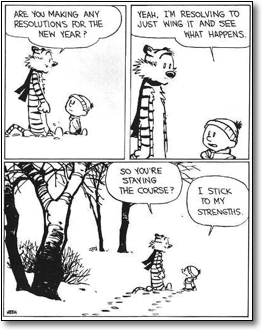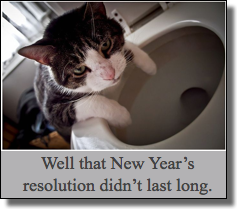 I’ve never been a fan of New Year’s resolutions. If you are like most, you are not either. Yet, on January 1st, 45% of Americans will make a vow to achieve a goal this coming year. 92% of them will be disappointed.
I’ve never been a fan of New Year’s resolutions. If you are like most, you are not either. Yet, on January 1st, 45% of Americans will make a vow to achieve a goal this coming year. 92% of them will be disappointed.
It’s not that I am against improving myself. I just don’t like the odds. I think the only resolution I have been able to keep was to not make any more resolutions.
Why do 92% of all resolutions fail? One reason I believe they fail is because we choose goals where failure is a viable result. The results are binary – you either succeed or you don’t. “I will lose 20 pounds.” “I will quit smoking.” “I will get pregnant.” There is no “kind of pregnant.” You leave no possibility for claiming partial success.We also choose goals where the opportunities to fail far outnumber the ways to succeed. You have 52 opportunities to not work out 4 days a week, every week of the year, versus the one way to succeed.
The main reason resolutions fail is they project success some distant point in the future. Every day until then is a very real possibility of failure. Daniel Kahneman and Nicholas Tversky have demonstrated that we feel losses far more deeply than gains of the same value. If  we miss a workout, we will carry emotional baggage over our head that is far greater than the high we get from working out all four days that week. This baggage makes the goal seem even harder than when you first made it. I am not sure I want a bet with myself where the pain of losing is greater than the joy of winning.
we miss a workout, we will carry emotional baggage over our head that is far greater than the high we get from working out all four days that week. This baggage makes the goal seem even harder than when you first made it. I am not sure I want a bet with myself where the pain of losing is greater than the joy of winning.
What’s a frustrated guy to do if he wants to improve himself?
Benjamin Zander, author of The Art of Possibility, convincingly taught me that everything is invented. We live within frameworks that are largely of our own invention. We have more control over our own reality than we think we do. If we have that control, why not create a reality that benefits us? In other words, if you don’t like the game, change the rules.
Don’t choose a resolution that has the odds stacked against you, where winning is in the distant future. Instead, focus on things that are more in your control with shorter time spans for success. Repeatedly doing these small tasks over a period of time will likely lead to that goal state you originally desired in the first place.
I call this the Shareholder Philosophy. Despite what Jack Welch said, your goal as an employee isn’t to go into work every day trying to find a way to increase your company’s shareholder value. You go in every day trying to create value for your customer. If you are repeatedly successful at that, shareholder value will come as a natural derivative of your daily customer actions. The same principle holds true with many resolutions.
 Turn your big goal into a smaller behaviors. Make your goal the smaller behaviors. Instead of one goal to lose 20 pounds, you have 365 goals to eat as well or better than yesterday. Instead of creating one goal of trying to get to the gym 4 times every week, create 208 goals to get to the gym. Instead of wanting to get control over your email load, divide the task into daily accomplishments where every night you ask yourself “Was I better today than yesterday.” That way, when you have a setback (which you will), you will only absorb the pain of losing one of 208 or 365 goals. The next day starts a new goal. You are only 24 hours away from changing the trend positive.
Turn your big goal into a smaller behaviors. Make your goal the smaller behaviors. Instead of one goal to lose 20 pounds, you have 365 goals to eat as well or better than yesterday. Instead of creating one goal of trying to get to the gym 4 times every week, create 208 goals to get to the gym. Instead of wanting to get control over your email load, divide the task into daily accomplishments where every night you ask yourself “Was I better today than yesterday.” That way, when you have a setback (which you will), you will only absorb the pain of losing one of 208 or 365 goals. The next day starts a new goal. You are only 24 hours away from changing the trend positive.
The immediate feedback and chance to start over tomorrow are wonderful psychological tricks that help us remove the dark cloud that often accompanies trying to achieve a big, hairy, audacious goal. We are all big masses of who we are today, each with a gravitational pull to stay where we are. It’s much easier to break that gravitational pull by focusing on the first step than focusing on total release. Celebrate the steps by making them your resolution.






